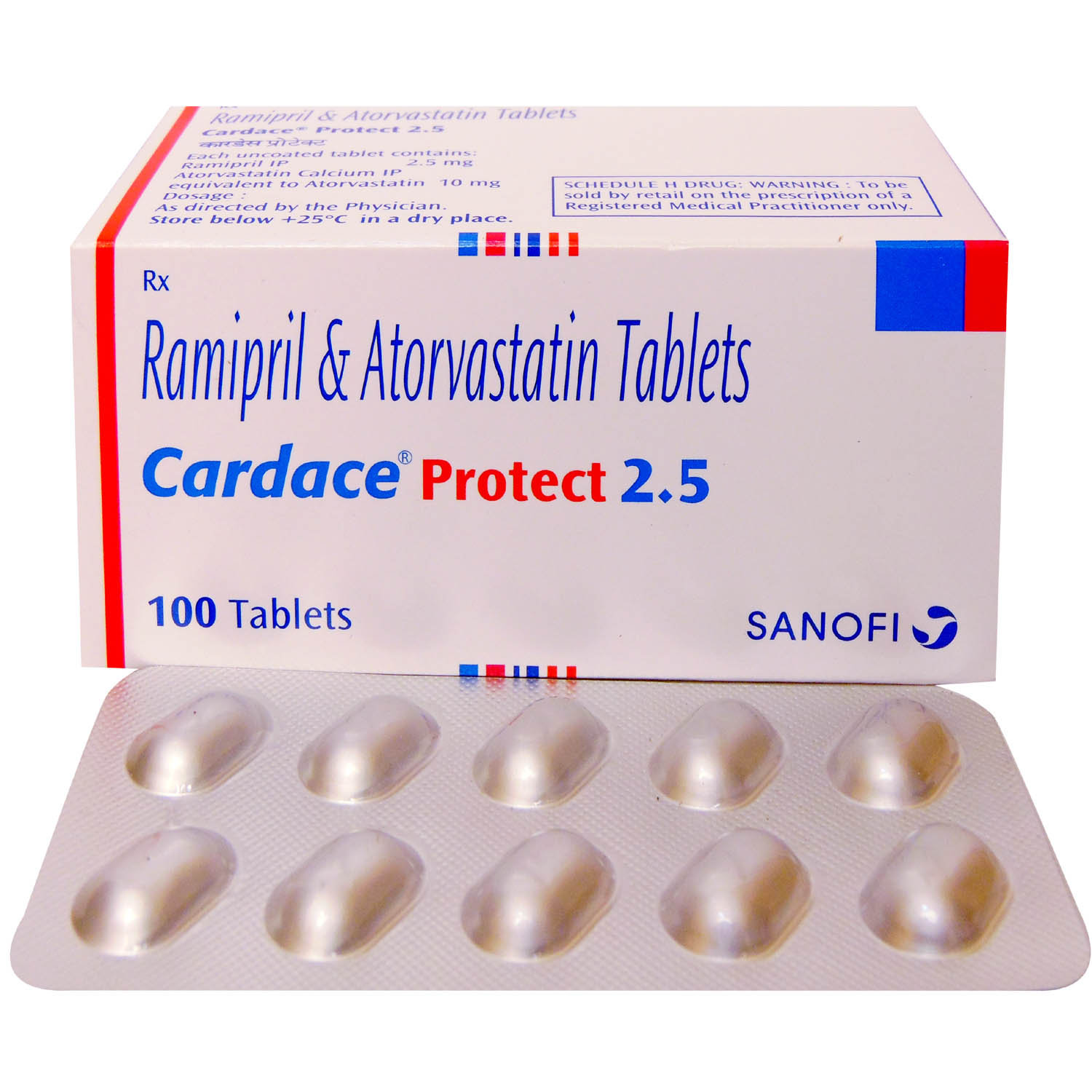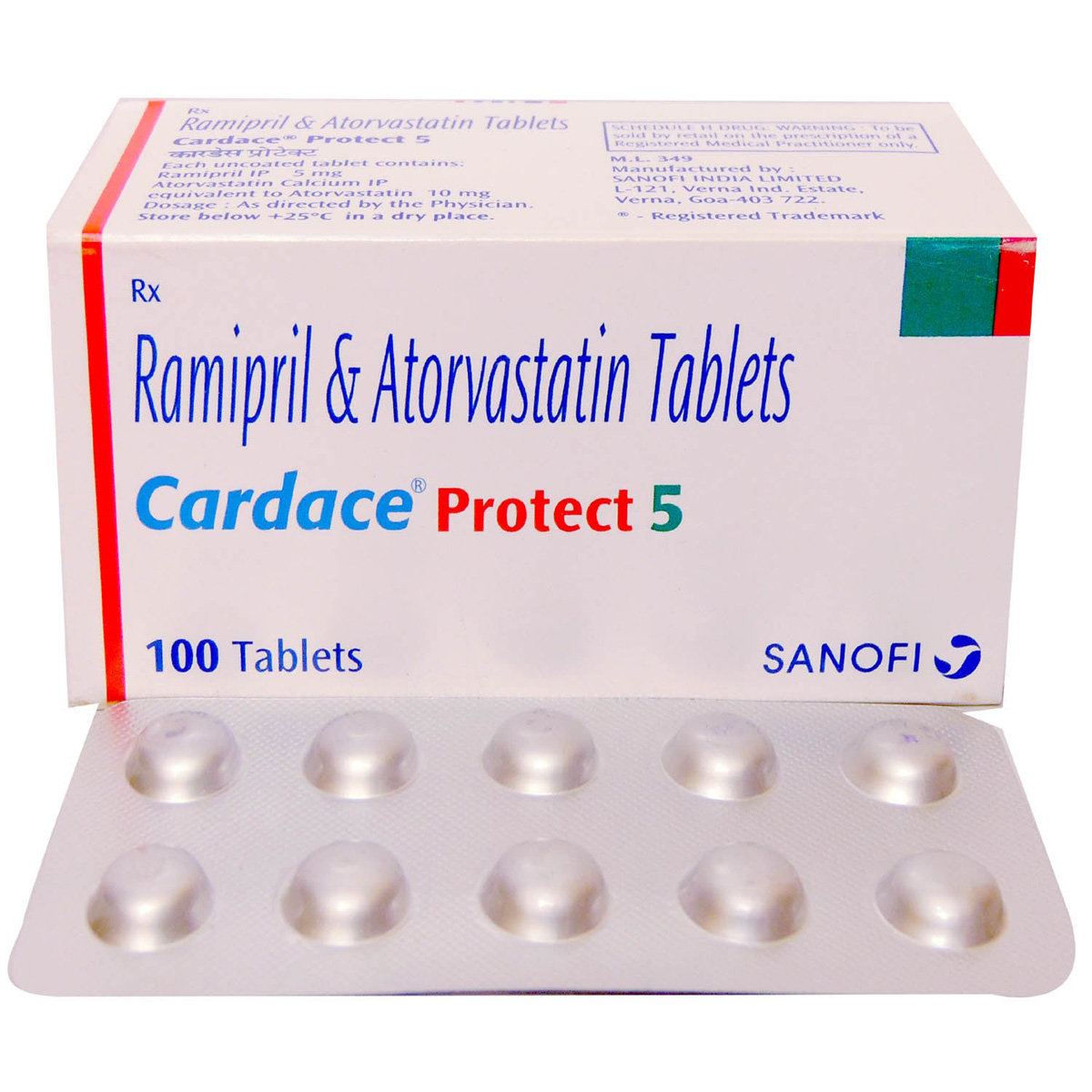Atorvastatin+ramipril
About Atorvastatin+ramipril
Atorvastatin+ramipril is an anti-hypertensive medicine primarily used to treat high blood pressure (hypertension) and reduce the risk of having a heart attack, stroke, or heart failure. Besides this, it also lowers the raised level of bad cholesterol (especially for those at high risk of heart disease). High blood pressure is a chronic condition in which the pressure in the blood vessels is high. The blood exerts high pressure on the walls of blood vessels (arteries), leading to hypertension. Heart failure can occur when your heart cannot pump the blood sufficiently required to the remaining body. A heart attack is the blockage of blood flow to the heart muscle. The blockage is most often a build-up of fat, cholesterol, and other substances, forming plaque in the arteries that feed the heart (coronary arteries). Heart attack and brain stroke happen simultaneously, as, in a stroke, the blood supply to the brain gets interrupted, causing a part of the brain to die.
Atorvastatin+ramipril is made up of two medications: atorvastatin and ramipril. Atorvastatin is a cholesterol-lowering medication that inhibits the enzyme responsible for fat production in the body. It lowers bad cholesterol (also known as LDL or low-density lipoproteins) and triglycerides (TG). It raises good cholesterol levels (also known as high-density lipoproteins or HDL). Ramipril is an angiotensin-converting enzyme (ACE) inhibitor that lowers high blood pressure by blocking angiotensin II, a naturally occurring substance that tightens your blood vessels. This relaxes blood vessels in the body, reducing the burden on the heart to pump more blood. Atorvastatin+ramipril reduces the risk of heart attack, stroke, and heart-related chest pain when taken together (angina).
You are advised to take Atorvastatin+ramipril for as long as your doctor has prescribed it for you, depending upon your medical condition. The most common side effects of Atorvastatin+ramipril are increased bleeding tendency, constipation, headache, muscle pain, weakness, headaches, decreased blood pressure, dizziness, muscle pain, increased blood glucose level, and cough in some cases. Most of these side effects of Atorvastatin+ramipril do not require medical attention and gradually resolve over time. However, if the side effects are persistent, reach out to your doctor.
Try not to stop taking this medicine of your own. Stopping Atorvastatin+ramipril abruptly may worsen your condition and increase your risk of a future heart attack. Tell your doctor if you are sensitive to atorvastatin or have any active liver disease, active bleeding issues (like a peptic ulcer or brain haemorrhage), muscle problems (myopathy, rhabdomyolysis), pregnant or planning to become pregnant or breastfeeding. Patients should inform the doctor they are taking Atorvastatin+ramipril before any surgery is scheduled or any new medicine is taken. Atorvastatin, present in Atorvastatin+ramipril is a pregnancy category X drug, so it is contraindicated in pregnant women. As it may cause harm to the fetus if administered to pregnant women. Inform your doctor that you are taking Atorvastatin+ramipril if you are going to have any surgery.
Uses of Atorvastatin+ramipril
Medicinal Benefits
Atorvastatin+ramipril is composed of two medicines, namely: Atorvastatin and Ramipril. Atorvastatin is a cholesterol-lowering medication that blocks the enzyme required to make fat in the body. It reduces bad cholesterol (also known as low-density lipoproteins or LDL) and triglycerides (TG). It increases good cholesterol levels (also known as high-density lipoproteins or HDL). Ramipril is an angiotensin-converting enzyme or ACE inhibitor that lower increased blood pressure by blocking a naturally occurring substance known as angiotensin II that tightens your blood vessels, thereby relaxing blood vessels in the body which reduces overload on the heart to pump more blood. Together Atorvastatin+ramipril reduces the risk of heart attack, stroke, and heart-related chest pain (angina).
Directions for Use
- Take Atorvastatin+ramipril with or without food or as advised by a doctor.
- Follow your doctor's instructions on the dosage and timing of this medication, to ensure the safety.
- Swallow the medicine as a whole with glass of water.
- Do not crush, break, or chew it.
Storage
Side Effects of Atorvastatin+ramipril
- Increased bleeding tendency
- Constipation
- Headache
- Muscle pain
- Weakness
- Headaches
- Decreased blood pressure
- Dizziness
- Muscle pain
- The increased blood glucose level
- Cough
Drug Warnings
Tell your doctor if you are allergic to Atorvastatin, or Ramipril, have any active liver disease, active bleeding issues (like a peptic ulcer or brain haemorrhage), are pregnant or planning to become pregnant, or breastfeeding. The patient should inform the doctor they are taking Atorvastatin+ramipril before any surgery is scheduled, or any new medicine is taken. Atorvastatin, present in Atorvastatin+ramipril is a pregnancy category X drug, so it is contraindicated in pregnant women. As it may cause harm to the fetus if administered to a pregnant woman. Co-administration with anticoagulants like warfarin may cause gastric bleeding and other bleeding problems. So, if you are using any blood-thinning agents, let your doctor know about this. Atorvastatin+ramipril contains Atorvastatin which can cause muscle problems like myopathy and rhabdomyolysis. So, any signs of muscle pain, tenderness, or weakness, during the initial months of the treatment should be closely monitored. Patients with active liver disease should use Atorvastatin+ramipril with caution. The safety and effectiveness of Atorvastatin+ramipril have not been established, so its use should be avoided in pediatric patients or children less than 12 years of age. Discontinuation of Atorvastatin+ramipril may lead to cardiovascular events like heart attack, stroke, and angina (heart-related chest pain). Hence, you should consult a doctor before stopping the dose of Atorvastatin+ramipril.
Drug Interactions
Drug-Drug Interaction: Atorvastatin+ramipril interacts with Atorvastatin+ramipril, so it should be used with caution with an antibiotic (clarithromycin), anti-HIV drugs (ritonavir, lopinavir, darunavir, atazanavir, indinavir) and antifungal (itraconazole), blood thinners (warfarin, heparin), anti-arthritis drug (colchicine), heart-related medicine (digoxin), and immune system affecting drug (cyclosporine).
Drug-Food Interaction: Alcoholic beverages and grapefruit or its juice intake should be avoided with Atorvastatin+ramipril as it may interact with Atorvastatin+ramipril to produce unpleasant side effects.
Drug-Disease Interaction: Atorvastatin+ramipril should not be given to the patients with active liver disease, active bleeding issues (like peptic ulcer, brain haemorrhage), muscle problems or musculoskeletal problems (myopathy, rhabdomyolysis), asthma, purpura (blood leakage under the skin), patients with nil urine output (anuria), cardiogenic shock (when the heart fails to pump required blood to the body), low blood pressure (hypotension), coronary heart disease, heart failure, high serum potassium (hyperkalemia), patients with nil urine output (anuria).
Drug-Drug Interactions Checker List:
Safety Advice

Alcohol
unsafeAtorvastatin+ramipril should not be taken until prescribed if you are taking alcohol. Keep your doctor informed if you drink alcohol. Drinking alcohol with Atorvastatin+ramipril may potentiate gastric or stomach bleeding and ulcer symptoms. So, try to avoid or limit the consumption of alcoholic beverages while using Atorvastatin+ramipril.

Pregnancy
unsafeAtorvastatin+ramipril is not recommended for use in pregnancy. If you are pregnant, consult your doctor before taking this medicine.

Breast Feeding
cautionIf you are breastfeeding, consult your doctor before taking this medicine. Your doctor will weigh the benefits and risks before prescribing it.

Driving
cautionDrive with caution as Atorvastatin+ramipril can cause dizziness and may affect your driving ability.

Liver
cautionAtorvastatin+ramipril to be taken with caution, especially if you have a history of liver diseases/conditions. Your doctor may adjust the dose based on your condition.

Kidney
cautionAtorvastatin+ramipril to be taken with caution, especially if you have a history of kidney diseases/conditions. Your doctor may adjust the dose based on your condition.

Children
cautionAtorvastatin+ramipril is not recommended for children below the age of 12 years. The safety and effectiveness of Atorvastatin+ramipril have not been established in children.
Habit Forming
Diet & Lifestyle Advise
- Eat a healthy diet rich in soluble fibre like beans, legumes, whole grains, flax, apples, and citrus fruits.
- Try to replace most of your saturated fats with unsaturated fats that can reduce total cholesterol and LDL cholesterol quickly. Foods like avocados, olive oil, fatty fish, and nuts contain many heart-healthy unsaturated fats, so it’s beneficial to eat them regularly.
- Try to adopt a Mediterranean-style diet rich in olive oil, fruits, vegetables, nuts, whole grains, and fish, low in red meat and most dairy.
- Try to give priority to more fruits and veggies in your daily meal as these contain antioxidants that help to lower LDL - low-density lipoprotein (bad cholesterol)
- Minimize the intake of added sugar. The American Heart Association (ADA) recommends one should not eat more than 100 calories (25 grams) of added sugar for women and children and no more than 150 calories (37.5 grams) for men every day.
- American Heart Association recommends sodium chloride intake (table salt) should not exceed more than 2,300 mg per day as part of a healthy eating pattern.
- As a precautionary measure, do not consume alcohol and quit smoking.
Special Advise
- Diagnostic tests like complete blood count (CBC), blood sodium and potassium levels, kidney function, and liver function should be monitored while taking treatment with Atorvastatin+ramipril to check for side effects.
- Your doctor may recommend regular monitoring of electrolytes as ramipril in Atorvastatin+ramipril may increase your potassium levels.
Patients Concern
Disease/Condition Glossary
Hypertension: High blood pressure is a condition in which the pressure in the blood vessels is high. The blood exerts increased pressure on the walls of blood vessels leading to hypertension. It is expressed as systolic/diastolic blood pressure. Systolic pressure is the pressure in the arteries when the heart beats or pumps blood. Diastolic pressure is the pressure in the arteries between the heartbeats. Blood pressure is measured in millimetres of mercury (mmHg) by a blood pressure monitor (sphygmomanometer). Normal blood pressure is 120/80 mmHg. Symptoms of high blood pressure include headache, dizziness, nosebleeds, changes in vision, chest pain, weakness, and dyspnea (shortness of breath). However, most of the time, the signs and symptoms of hypertension are none. Heart failure occurs when the heart cannot pump sufficient blood to the remaining of the body.
Heart attack: A heart attack generally refers to a blocked flow of blood to the heart due to the blockage of arteries. The blockage is most often a build-up of fat, cholesterol, and other substances, forming plaque in the arteries that feed the heart (coronary arteries).
Stroke: It occurs when the blood and oxygen supply to the brain is limited or stopped. When the brain does not receive sufficient oxygen and nutrients, it dies within a few minutes. If not treated early, it is a life-threatening condition that can lead to brain damage, coma, and even death.
FAQs
Atorvastatin+ramipril is used to treat high blood pressure (hypertension) and reduce the risk of having a heart attack, stroke, or heart failure. Besides this, it also lowers the raised level of bad cholesterol (especially for those at high risk of heart disease).
Atorvastatin+ramipril is a combination of two drugs: atorvastatin and ramipril. Atorvastatin is a cholesterol-lowering medication that works by inhibiting the enzyme that causes fat production in the body. It lowers bad cholesterol and triglycerides (also known as LDL or low-density lipoproteins) (TG). It raises good cholesterol levels (high-density lipoproteins or HDL). Ramipril is an angiotensin-converting enzyme (ACE) inhibitor that lowers blood pressure by inhibiting angiotensin II, a naturally occurring substance that constricts blood vessels. This relaxes blood vessels in the body, relieving the heart of the burden of pumping more blood. When taken together, Atorvastatin+ramipril lowers the risk of heart attack, stroke, and heart-related chest pain (angina).
Usually, Atorvastatin+ramipril is prescribed for long-term treatment ranging from weeks to months for treating heart-related conditions and disorders. However, taking it alone for years without a doctor's consent can be fatal. Hence, only take it as long as your doctor prescribes it.
Atorvastatin+ramipril can raise your blood sugar, so if you already have type 2 diabetes, please consult your doctor. The doctor will weigh the benefits and any potential risks before prescribing it to you.
If you forget to take Atorvastatin+ramipril at any time, take it as soon as you remember, then continue to take it at the usual times. Do not take a double dose to make up for a forgotten dose.
It is recommended that renal function be monitored, particularly in the initial weeks of treatment with Atorvastatin+ramipril.
Atorvastatin+ramipril may increase your potassium levels. Before using potassium supplements or salt substitutes that contain potassium, consult your doctor for further advice.






